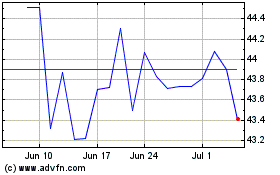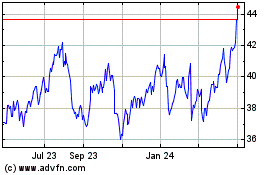Asian Markets Brace for Fresh 'Brexit' Buffeting
June 26 2016 - 9:00PM
Dow Jones News
HONG KONG—Shares and currencies in Asia are headed for a
potentially turbulent week, as the U.K.'s vote to leave the
European Union threatens more aftershocks in global financial
markets.
Fund managers and traders are bracing for further strength in
the yen, while more losses are expected for stocks such as HSBC
Holdings PLC and other British companies listed in the region.
Japan's Nikkei Stock Average, which suffered most in Asia after
Friday's 'Brexit' referendum, could remain in the firing line.
The U.K.'s unexpected 'leave' vote reverberated first in Asian
trading hours, sending the Nikkei down almost 8% and the Japanese
yen soaring to its highest level since November 2013. Economic
officials in Japan held a special meeting over the weekend to
discuss the state of the markets.
The yen often rises in times of market turmoil, as investors
regard it as a haven. However, that is bad for the profits of
Japan's many prominent exporting companies. The Nikkei is down 21%
year-to-date.
"Markets could get even more oversold," says Sean Taylor, chief
investment officer for Asia Pacific at Deutsche Asset Management in
Hong Kong, adding that investors might not start bargain hunting
for a few more weeks.
The direct economic impact on Asia from Britain's decision to
leave the EU trading bloc is expected to be limited, given only a
small proportion of the region's exports go to the U.K. Still,
Asian markets can't avoid the aversion to risk now gripping
investors around the world.
There is no sign yet things will get as bad as during the global
financial crisis in 2008, when markets almost seized up as
high-profile banks such as Lehman Brothers failed. But the
hammering given to bank stocks in London and New York on Friday
shows nerves are frayed.
There is already speculation about other EU members considering
their own votes on whether to quit, adding to the uncertainty
surrounding that region's economy.
Many leading central bankers, including the U.S. Federal Reserve
Chairwoman Janet Yellen, European Central Bank President Mario
Draghi and Bank of England Governor Mark Carney are all slated to
speak this week.
Beyond possible further pain in Japan, Goldman Sachs estimates a
further 5%-10% drop in the MSCI AC Asia Pacific ex-Japan benchmark
of shares, noting it closed down about 3.5% Friday.
Fund managers don't rule out buying opportunities emerging in
Asia in coming months. Many think Japanese authorities will do more
to try to shore up the country's economy, in particular by
intervening in currency markets to weaken the yen if it rises
further against the dollar.
"We think Bank of Japan draws the line in the sand at 100 [yen
to the dollar]," says Khiem Do, multiasset fund manager at Baring
Asset Management in Hong Kong. The currency traded as strong as ¥
99 to one U.S. dollar Friday. "That's why we don't want to be too
aggressive in selling of Japan [stocks] from here," he said.
China has been more insulated from 'Brexit' worries, with
overseas investors still restricted from putting money into and out
of the country easily. The main Shanghai Composite benchmark fell
just 1.3% Friday.
Investors could begin to see that market as a bit of an oasis,
say analysts.
"[There's] that trader gut feeling that [the second half of the
year] may well be China's time to shine given the EU uncertainty,"
says Gavin Parry, who runs Parry International Trading Ltd., a
boutique brokerage in Hong Kong. "Can't help thinking it's time to
fill your boots."
But China's yuan is a different story. 'Brexit' has pressured
global currencies, sending the yuan to its weakest level in more
than five years.
At Pimco's Singapore office, Asia portfolio manager Luke Spajic
said he is keeping "a very close eye on how the [onshore yuan
level] is being fixed."
The People's Bank of China, which manages the currency's daily
exchange level, pledged Friday to keep the yuan "basically stable."
Hours later, PBOC Governor Zhou Xiaochuan said the bank had been
monitoring the U.K. referendum and was in communication with the
International Monetary Fund, global central banks and other
authorities.
Investors say the best-case scenario for China and most Asian
markets is that the Federal Reserve further delays hiking interest
rates this year.
"Under current conditions, the markets will lower the likelihood
of monetary tightening, especially with the Fed," said Pimco's Mr.
Spajic. Higher U.S. interest rates could spell trouble for firms in
emerging markets, including in Asia, that are struggling to pay
back U.S. dollar loans.
Takashi Nakamichi and Pei Li contributed to this article.
Write to Chao Deng at Chao.Deng@wsj.com
(END) Dow Jones Newswires
June 26, 2016 20:45 ET (00:45 GMT)
Copyright (c) 2016 Dow Jones & Company, Inc.
HSBC (NYSE:HSBC)
Historical Stock Chart
From Mar 2024 to Apr 2024

HSBC (NYSE:HSBC)
Historical Stock Chart
From Apr 2023 to Apr 2024
